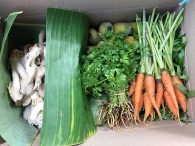








Based on a study conducted by the Lao Farmer Network (LFN) on youth in agriculture, young farmers will continue tending to their family farms if they can make sufficient income from these. As a response, LFN has piloted initiatives to support the youth so they can make a better income from agriculture. One of their initiatives is the ‘farmer basket’.
The Thongmang organic vegetable group—a group of about 40 smallholder farmers—is a member of LFN. The group sells their vegetables in organic markets and in a shopping mall. However, they find it hard to sell all of their produce and the group also does not have sufficient members to help with the labor. LFN provided support to the group to expand their production. A group of 12 to 19-year-old youths in the same village purchases vegetables from the Thongmang vegetable producers and sells these directly to consumers through a new marketing strategy they call “farmer basket”. Farmer basket is a marketing approach that uses a Facebook page to sell organic produce directly to consumers. A set of fresh vegetables and fruits are packed in a box which is sold to consumers. The system is piloted in 2017 with the Thongmang organic vegetable producer group in Sayseatha district, Vientiane, Laos.
“A box includes six kinds of vegetables and one fruit—all grade A organic products from our garden. The vegetables differ every week,” Ae, a member of the youth group, explained. A box of vegetables costs around $7. According to Ae, the farmers that supply vegetables are well-trained in production techniques such as harvesting. “We give them a higher price because they select the best vegetables for us,” he said. Grade A vegetables are given a 15% to 20% increase in price.
Here are sample sets offered by the group for the consumers:
- A vegetable box (includes 6 kinds of vegetables and 1 type of fruit) for USD 7
- Selective order based on available vegetables per week for as low as USD 7
- A set of bamboo shoot soup set for USD 8
- Mekong fish dip set for USD 12
- Native chicken soup set for USD 10
- Mixed salad set for USD 7
The youth group uses Facebook to advertise and sell the farmer basket as well as to communicate with consumers. To further sell their products, the group also targets office workers in Vientiane capital through face-to-face marketing.
Aside from helping the youth generate income, Farmer Basket is also embedded as a marketing opportunity for the Thongmang vegetable producer group. Through this system, they are able to sell their vegetables at a higher price—from one box, they can gain a profit of about USD 2, taking to account all expenses such as buying the vegetables, the box, and transportation. Thirty percent of the sales are added to the savings fund, while the other 70% goes to the marketing team who purchases vegetables from the members, packs these into boxes, delivers the boxes, and also does the advertising.
In addition to these benefits for farmers and youth, the consumers get quality fresh produce. Furthermore, consumption of organic products, as well as organic vegetable production, are promoted.
In piloting this initiative, LFN faced several challenges such as the limitation in the production capacity. After a few months of advertising the Farmer Basket, it became quite popular. In some instances, consumers would like to order 30 boxes of native chicken soup sets. However, the Thongmang group does not have the capacity to supply that demand.
Another challenge is that quality control is not guaranteed. The group has difficulties in ensuring consistency when it comes to the supply of the best quality organic produce and his leaves some consumers disappointed.
The group also found difficulty in packaging. Initially, they used paper boxes to package the vegetables. However, the vegetables lose quality because they dry up and rot quickly due to the heat. As a solution, the group shifted to a foam box with an iced bottle to maintain a cool temperature inside the box. With this system, vegetables remain fresh over a day.
Another challenge is the high transportation cost. The system works because the group schedules days when they go to sell at organic markets which do not incur additional transport costs and they deliver multiple boxes at once at the market sites of offices. However, many consumers prefer to have the boxes delivered to their houses, but this incurs additional transportation costs which results in a loss of profit per box.
From this initiative, LFN suggests that there is a need to build the production, harvesting, and packaging capacity of farmers and ensure quality control for the producer group before advertising the product to ensure that consumers will not be disappointed. LFN is set to provide more training on production and post-harvest techniques as well as marketing for the group to improve their services.
Moreover, Facebook is a cheap but effective tool to use and is accessible to consumers. LFN also notes that visiting offices to inform potential customers about the produce is important to establish links with consumers.
For those who are interested to try this, it is recommended to start small at first. It is good to start with young people because they normally use mobile phones and social media such as Facebook. It is also important that the farmers’ group does not live too far from the potential customers.
You may visit the Farmer’s Basket on Facebook at: www.facebook.com/farmerbasketLFN/.

Comments are closed